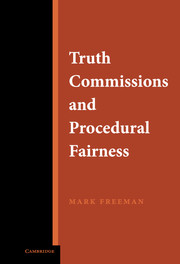Foreword
Published online by Cambridge University Press: 27 October 2009
Summary
Transitional justice has become a feature of the past three decades. It is a consequence of the significant number of nations that have struggled to make the transition from war to peace or from oppression and discrimination to forms of democratic government. The challenge facing such societies is the manner in which they should treat past serious human rights violations. The perpetrators seek blanket amnesties and the victims seek prosecution of the former leaders.
It is tempting in that context to forget the past in favor of building a new and better future. It is the line of least resistance. It is also a recipe for future disaster. Where past human rights violations are ignored and the victims forgotten, there is a cancer in such a society that remains dormant and available for use or abuse by some or other future despotic, nationalistic leader. Examples are there for the choosing – the Balkans, Rwanda, the Middle East.
More enlightened leaders have sought a third way between national amnesia and criminal prosecutions – the establishment of a truth commission. In chapter 1 of this work there is an excellent and concise history of truth commissions and an explanation of their relationship to courts and other forms of official and nonofficial truth-seeking mechanisms.
One of the challenges facing a truth commission is the fairness of its proceedings. It is all too easy to allow it to be used as a political platform to castigate the former regime.
- Type
- Chapter
- Information
- Truth Commissions and Procedural Fairness , pp. xi - xiiPublisher: Cambridge University PressPrint publication year: 2006



